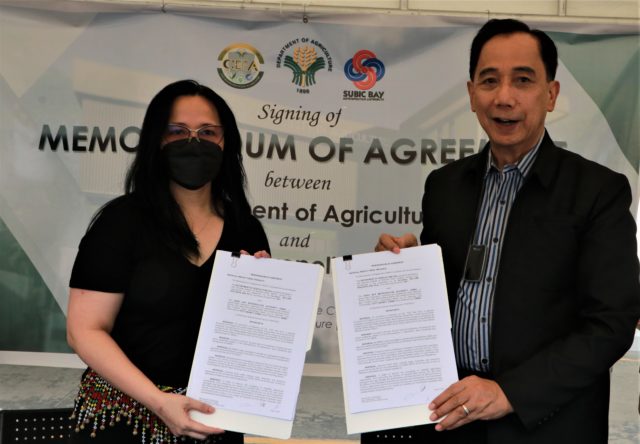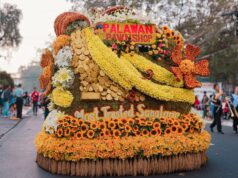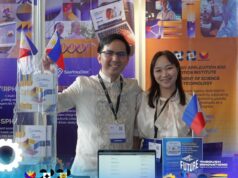SBMA chair and administrator Wilma T. Eisma and Agriculture Secretary William Dar show signed MOA for the construction of the country’s first Cold Examination Facility in Agriculture in the Subic Bay Freeport Zone. Photo by Malou Dungog
SUBIC BAY FREEPORT – The Subic Bay Metropolitan Authority and the Department of Agriculture have signed a memorandum of agreement for the establishment of a control facility for fresh and frozen agri-fishery commodities entering the country through this freeport.
SBMA chair and administrator Wilma T. Eisma and Agriculture Secretary William Dar formalized the agreement here on Friday, following initial talks in July.
The proposed Cold Examination Facility in Agriculture (CEFA) in Subic—the first of five such facilities planned to be built nationwide —will cost P509.5 million and will facilitate 100-percent inspection of agri-fishery cargoes arriving here.
“It will also enhance industrial and commercial activities in Subic and foster the free flow of goods in the freeport zone,” Eisma noted.
The project supports the national government’s thrust to strengthen the food safety regulatory system in the country to protect consumer health as mandated by RA 10611 (An Act to Strengthen the Food Safety Regulatory System in the Country to Protect Consumer Health and Facilitate Market Access of Local Foods and Food Products).
Dar said the Subic CEFA will ideally be constructed in a 2,000-sqm area along the San Bernardino Road near Subic’s New Container Terminal. The CEFA will be completed within eight months upon the start of construction, he added.
Dar added that the DA will use the property strictly as a “first border facility” to thoroughly inspect imported containerized agri-fishery commodities and prevent the entry of transboundary agri-fishery pests and diseases.
He said the facility will house examination areas and laboratories intended for the execution quarantine and inspection protocols enforced by the agency’s Bureau of Animal Industry, Bureau of Plant Industry, and Bureau of Fisheries and Aquatic Resources.
“We have also taken into consideration the volume of cargoes arriving here,” Dar pointed out. “We expect 26,000 containers of meat, meat products, fisheries and plant commodities to enter the Subic Freeport each year,” he added, citing the need to examine all these cargoes.
With the proposed facility, Dar said the DA will be able to undertake 100 percent in-depth inspection of containerized animal, fish and plant commodities identified through the Risk Assessment Categorization, and will be complemented by the X-ray screening of the Bureau of Customs which will be subject to sampling and laboratory testing.
He said the facility will also have a crematorium to dispose of confiscated agricultural products and by-products, including those misdeclared, unfit for human consumption, and contaminated and/or infected.
“I assure everyone that the emission from the components of the crematorium and its appurtenance will not cause harm to the health and well-being of the port workers and port users or cause adverse effect to the environment,” Dar also said.
Prior to the signing of agreement, Dar had announced that the Subic CEFA will earn at least P130 million a year in testing and inspection fees.
The DA said similar facilities are being eyed for construction in the ports of Manila, Batangas, Cebu and Davao.





